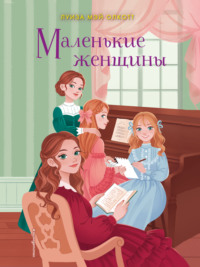 полная версия
полная версияLittle Women: or, Meg, Jo, Beth, and Amy
"Oh, oh, oh! what have you done? I'm spoilt! I can't go! My hair, oh, my hair!" wailed Meg, looking with despair at the uneven frizzle on her forehead.
"Just my luck! you shouldn't have asked me to do it; I always spoil everything. I'm so sorry, but the tongs were too hot, and so I've made a mess," groaned poor Jo, regarding the black pancakes with tears of regret.
"It isn't spoilt; just frizzle it, and tie your ribbon so the ends come on your forehead a bit, and it will look like the last fashion. I've seen many girls do it so," said Amy consolingly.
"Serves me right for trying to be fine. I wish I'd let my hair alone," cried Meg petulantly.
"So do I, it was so smooth and pretty. But it will soon grow out again," said Beth, coming to kiss and comfort the shorn sheep.
After various lesser mishaps, Meg was finished at last, and by the united exertions of the family Jo's hair was got up and her dress on. They looked very well in their simple suits, – Meg in silvery drab, with a blue velvet snood, lace frills, and the pearl pin; Jo in maroon, with a stiff, gentlemanly linen collar, and a white chrysanthemum or two for her only ornament. Each put on one nice light glove, and carried one soiled one, and all pronounced the effect "quite easy and fine." Meg's high-heeled slippers were very tight, and hurt her, though she would not own it, and Jo's nineteen hair-pins all seemed stuck straight into her head, which was not exactly comfortable; but, dear me, let us be elegant or die!
"Have a good time, dearies!" said Mrs. March, as the sisters went daintily down the walk. "Don't eat much supper, and come away at eleven, when I send Hannah for you." As the gate clashed behind them, a voice cried from a window, —
"Girls, girls! have you both got nice pocket-handkerchiefs?"
"Yes, yes, spandy nice, and Meg has cologne on hers," cried Jo, adding, with a laugh, as they went on, "I do believe Marmee would ask that if we were all running away from an earthquake."
"It is one of her aristocratic tastes, and quite proper, for a real lady is always known by neat boots, gloves, and handkerchief," replied Meg, who had a good many little "aristocratic tastes" of her own.
"Now don't forget to keep the bad breadth out of sight, Jo. Is my sash right? and does my hair look very bad?" said Meg, as she turned from the glass in Mrs. Gardiner's dressing-room, after a prolonged prink.
"I know I shall forget. If you see me doing anything wrong, just remind me by a wink, will you?" returned Jo, giving her collar a twitch and her head a hasty brush.
"No, winking isn't lady-like; I'll lift my eyebrows if anything is wrong, and nod if you are all right. Now hold your shoulders straight, and take short steps, and don't shake hands if you are introduced to any one: it isn't the thing."
"How do you learn all the proper ways? I never can. Isn't that music gay?"
Down they went, feeling a trifle timid, for they seldom went to parties, and, informal as this little gathering was, it was an event to them. Mrs. Gardiner, a stately old lady, greeted them kindly, and handed them over to the eldest of her six daughters. Meg knew Sallie, and was at her ease very soon; but Jo, who didn't care much for girls or girlish gossip, stood about, with her back carefully against the wall, and felt as much out of place as a colt in a flower-garden. Half a dozen jovial lads were talking about skates in another part of the room, and she longed to go and join them, for skating was one of the joys of her life. She telegraphed her wish to Meg, but the eyebrows went up so alarmingly that she dared not stir. No one came to talk to her, and one by one the group near her dwindled away, till she was left alone. She could not roam about and amuse herself, for the burnt breadth would show, so she stared at people rather forlornly till the dancing began. Meg was asked at once, and the tight slippers tripped about so briskly that none would have guessed the pain their wearer suffered smilingly. Jo saw a big redheaded youth approaching her corner, and fearing he meant to engage her, she slipped into a curtained recess, intending to peep and enjoy herself in peace. Unfortunately, another bashful person had chosen the same refuge; for, as the curtain fell behind her, she found herself face to face with the "Laurence boy."
"Dear me, I didn't know any one was here!" stammered Jo, preparing to back out as speedily as she had bounced in.
But the boy laughed, and said pleasantly, though he looked a little startled, —
"Don't mind me; stay, if you like."
"Sha'n't I disturb you?"
"Not a bit; I only came here because I don't know many people, and felt rather strange at first, you know."
"So did I. Don't go away, please, unless you'd rather."
The boy sat down again and looked at his pumps, till Jo said, trying to be polite and easy, —
"I think I've had the pleasure of seeing you before; you live near us, don't you?"
"Next door"; and he looked up and laughed outright, for Jo's prim manner was rather funny when he remembered how they had chatted about cricket when he brought the cat home.
That put Jo at her ease; and she laughed too, as she said, in her heartiest way, —
"We did have such a good time over your nice Christmas present."
"Grandpa sent it."
"But you put it into his head, didn't you, now?"
"How is your cat, Miss March?" asked the boy, trying to look sober, while his black eyes shone with fun.
"Nicely, thank you, Mr. Laurence; but I am not Miss March, I'm only Jo," returned the young lady.
"I'm not Mr. Laurence, I'm only Laurie."
"Laurie Laurence, – what an odd name!"
"My first name is Theodore, but I don't like it, for the fellows called me Dora, so I made them say Laurie instead."
"I hate my name, too – so sentimental! I wish every one would say Jo, instead of Josephine. How did you make the boys stop calling you Dora?"
"I thrashed 'em."
"I can't thrash Aunt March, so I suppose I shall have to bear it"; and Jo resigned herself with a sigh.
"Don't you like to dance, Miss Jo?" asked Laurie, looking as if he thought the name suited her.
"I like it well enough if there is plenty of room, and every one is lively. In a place like this I'm sure to upset something, tread on people's toes, or do something dreadful, so I keep out of mischief, and let Meg sail about. Don't you dance?"
"Sometimes; you see I've been abroad a good many years, and haven't been into company enough yet to know how you do things here."
"Abroad!" cried Jo. "Oh, tell me about it! I love dearly to hear people describe their travels."
Laurie didn't seem to know where to begin; but Jo's eager questions soon set him going, and he told her how he had been at school in Vevay, where the boys never wore hats, and had a fleet of boats on the lake, and for holiday fun went walking trips about Switzerland with their teachers.
"Don't I wish I'd been there!" cried Jo. "Did you go to Paris?"
"We spent last winter there."
"Can you talk French?"
"We were not allowed to speak any thing else at Vevay."
"Do say some! I can read it, but can't pronounce."
"Quel nom a cette jeune demoiselle en les pantoufles jolis?" said Laurie good-naturedly.
"How nicely you do it! Let me see, – you said, 'Who is the young lady in the pretty slippers,' didn't you?"
"Oui, mademoiselle."
"It's my sister Margaret, and you knew it was! Do you think she is pretty?"
"Yes; she makes me think of the German girls, she looks so fresh and quiet, and dances like a lady."
Jo quite glowed with pleasure at this boyish praise of her sister, and stored it up to repeat to Meg. Both peeped and criticised and chatted, till they felt like old acquaintances. Laurie's bashfulness soon wore off; for Jo's gentlemanly demeanor amused and set him at his ease, and Jo was her merry self again, because her dress was forgotten, and nobody lifted their eyebrows at her. She liked the "Laurence boy" better than ever, and took several good looks at him, so that she might describe him to the girls; for they had no brothers, very few male cousins, and boys were almost unknown creatures to them.
"Curly black hair; brown skin; big, black eyes; handsome nose; fine teeth; small hands and feet; taller than I am; very polite, for a boy, and altogether jolly. Wonder how old he is?"
It was on the tip of Jo's tongue to ask; but she checked herself in time, and, with unusual tact, tried to find out in a roundabout way.
"I suppose you are going to college soon? I see you pegging away at your books, – no, I mean studying hard"; and Jo blushed at the dreadful "pegging" which had escaped her.
Laurie smiled, but didn't seem shocked, and answered, with a shrug, —
"Not for a year or two; I won't go before seventeen, anyway."
"Aren't you but fifteen?" asked Jo, looking at the tall lad, whom she had imagined seventeen already.
"Sixteen, next month."
"How I wish I was going to college! You don't look as if you liked it."
"I hate it! Nothing but grinding or skylarking. And I don't like the way fellows do either, in this country."
"What do you like?"
"To live in Italy, and to enjoy myself in my own way."
Jo wanted very much to ask what his own way was; but his black brows looked rather threatening as he knit them; so she changed the subject by saying, as her foot kept time, "That's a splendid polka! Why don't you go and try it?"
"If you will come too," he answered, with a gallant little bow.
"I can't; for I told Meg I wouldn't, because – " There Jo stopped, and looked undecided whether to tell or to laugh.
"Because what?" asked Laurie curiously.
"You won't tell?"
"Never!"
"Well, I have a bad trick of standing before the fire, and so I burn my frocks, and I scorched this one; and, though it's nicely mended, it shows, and Meg told me to keep still, so no one would see it. You may laugh, if you want to; it is funny, I know."
But Laurie didn't laugh; he only looked down a minute, and the expression of his face puzzled Jo, when he said very gently, —
"Never mind that; I'll tell you how we can manage: there's a long hall out there, and we can dance grandly, and no one will see us. Please come?"
Jo thanked him, and gladly went, wishing she had two neat gloves, when she saw the nice, pearl-colored ones her partner wore. The hall was empty, and they had a grand polka; for Laurie danced well, and taught her the German step, which delighted Jo, being full of swing and spring. When the music stopped, they sat down on the stairs to get their breath; and Laurie was in the midst of an account of a students' festival at Heidelberg, when Meg appeared in search of her sister. She beckoned, and Jo reluctantly followed her into a side-room, where she found her on a sofa, holding her foot, and looking pale.
"I've sprained my ankle. That stupid high heel turned, and gave me a sad wrench. It aches so, I can hardly stand, and I don't know how I'm ever going to get home," she said, rocking to and fro in pain.
"I knew you'd hurt your feet with those silly shoes. I'm sorry. But I don't see what you can do, except get a carriage, or stay here all night," answered Jo, softly rubbing the poor ankle as she spoke.
"I can't have a carriage, without its costing ever so much. I dare say I can't get one at all; for most people come in their own, and it's a long way to the stable, and no one to send."
"I'll go."
"No, indeed! It's past nine, and dark as Egypt. I can't stop here, for the house is full. Sallie has some girls staying with her. I'll rest till Hannah comes, and then do the best I can."
"I'll ask Laurie; he will go," said Jo, looking relieved as the idea occurred to her.
"Mercy, no! Don't ask or tell any one. Get me my rubbers, and put these slippers with our things. I can't dance any more; but as soon as supper is over, watch for Hannah, and tell me the minute she comes."
"They are going out to supper now. I'll stay with you; I'd rather."
"No, dear, run along, and bring me some coffee. I'm so tired, I can't stir!"
So Meg reclined, with rubbers well hidden, and Jo went blundering away to the dining-room, which she found after going into a china-closet, and opening the door of a room where old Mr. Gardiner was taking a little private refreshment. Making a dart at the table, she secured the coffee, which she immediately spilt, thereby making the front of her dress as bad as the back.
"Oh, dear, what a blunderbuss I am!" exclaimed Jo, finishing Meg's glove by scrubbing her gown with it.
"Can I help you?" said a friendly voice; and there was Laurie, with a full cup in one hand and a plate of ice in the other.
"I was trying to get something for Meg, who is very tired, and some one shook me; and here I am, in a nice state," answered Jo, glancing dismally from the stained skirt to the coffee-colored glove.
"Too bad! I was looking for some one to give this to. May I take it to your sister?"
"Oh, thank you! I'll show you where she is. I don't offer to take it myself, for I should only get into another scrape if I did."
Jo led the way; and, as if used to waiting on ladies, Laurie drew up a little table, brought a second instalment of coffee and ice for Jo, and was so obliging that even particular Meg pronounced him a "nice boy." They had a merry time over the bonbons and mottoes, and were in the midst of a quiet game of "Buzz," with two or three other young people who had strayed in, when Hannah appeared. Meg forgot her foot, and rose so quickly that she was forced to catch hold of Jo, with an exclamation of pain.
"Hush! Don't say anything," she whispered, adding aloud, "It's nothing. I turned my foot a little, that's all"; and limped up-stairs to put her things on.
Hannah scolded, Meg cried, and Jo was at her wits' end, till she decided to take things into her own hands. Slipping out, she ran down, and, finding a servant, asked if he could get her a carriage. It happened to be a hired waiter, who knew nothing about the neighborhood; and Jo was looking round for help, when Laurie, who had heard what she said, came up, and offered his grandfather's carriage, which had just come for him, he said.
"It's so early! You can't mean to go yet?" began Jo, looking relieved, but hesitating to accept the offer.
"I always go early, – I do, truly! Please let me take you home? It's all on my way, you know, and it rains, they say."
That settled it; and, telling him of Meg's mishap, Jo gratefully accepted, and rushed up to bring down the rest of the party. Hannah hated rain as much as a cat does; so she made no trouble, and they rolled away in the luxurious close carriage, feeling very festive and elegant. Laurie went on the box, so Meg could keep her foot up, and the girls talked over their party in freedom.
"I had a capital time. Did you?" asked Jo, rumpling up her hair, and making herself comfortable.
"Yes, till I hurt myself. Sallie's friend, Annie Moffat, took a fancy to me, and asked me to come and spend a week with her, when Sallie does. She is going in the spring, when the opera comes; and it will be perfectly splendid, if mother only lets me go," answered Meg, cheering up at the thought.
"I saw you dancing with the red-headed man I ran away from. Was he nice?"
"Oh, very! His hair is auburn, not red; and he was very polite, and I had a delicious redowa with him."
"He looked like a grasshopper in a fit, when he did the new step. Laurie and I couldn't help laughing. Did you hear us?"
"No; but it was very rude. What were you about all that time, hidden away there?"
Jo told her adventures, and, by the time she had finished, they were at home. With many thanks, they said "Good night," and crept in, hoping to disturb no one; but the instant their door creaked, two little night-caps bobbed up, and two sleepy but eager voices cried out, —
"Tell about the party! tell about the party!"
With what Meg called "a great want of manners," Jo had saved some bonbons for the little girls; and they soon subsided, after hearing the most thrilling events of the evening.
"I declare, it really seems like being a fine young lady, to come home from the party in a carriage, and sit in my dressing-gown, with a maid to wait on me," said Meg, as Jo bound up her foot with arnica, and brushed her hair.
"I don't believe fine young ladies enjoy themselves a bit more than we do, in spite of our burnt hair, old gowns, one glove apiece, and tight slippers that sprain our ankles when we are silly enough to wear them." And I think Jo was quite right.
IV
BURDENS
"Oh dear, how hard it does seem to take up our packs and go on," sighed Meg, the morning after the party; for, now the holidays were over, the week of merry-making did not fit her for going on easily with the task she never liked.
"I wish it was Christmas or New-Year all the time; wouldn't it be fun?" answered Jo, yawning dismally.
"We shouldn't enjoy ourselves half so much as we do now. But it does seem so nice to have little suppers and bouquets, and go to parties, and drive home, and read and rest, and not work. It's like other people, you know, and I always envy girls who do such things; I'm so fond of luxury," said Meg, trying to decide which of two shabby gowns was the least shabby.
"Well, we can't have it, so don't let us grumble, but shoulder our bundles and trudge along as cheerfully as Marmee does. I'm sure Aunt March is a regular Old Man of the Sea to me, but I suppose when I've learned to carry her without complaining, she will tumble off, or get so light that I sha'n't mind her."
This idea tickled Jo's fancy, and put her in good spirits; but Meg didn't brighten, for her burden, consisting of four spoilt children, seemed heavier than ever. She hadn't heart enough even to make herself pretty, as usual, by putting on a blue neck-ribbon, and dressing her hair in the most becoming way.
"Where's the use of looking nice, when no one sees me but those cross midgets, and no one cares whether I'm pretty or not?" she muttered, shutting her drawer with a jerk. "I shall have to toil and moil all my days, with only little bits of fun now and then, and get old and ugly and sour, because I'm poor, and can't enjoy my life as other girls do. It's a shame!"
So Meg went down, wearing an injured look, and wasn't at all agreeable at breakfast-time. Every one seemed rather out of sorts, and inclined to croak. Beth had a headache, and lay on the sofa, trying to comfort herself with the cat and three kittens; Amy was fretting because her lessons were not learned, and she couldn't find her rubbers; Jo would whistle and make a great racket getting ready; Mrs. March was very busy trying to finish a letter, which must go at once; and Hannah had the grumps, for being up late didn't suit her.
"There never was such a cross family!" cried Jo, losing her temper when she had upset an inkstand, broken both boot-lacings, and sat down upon her hat.
"You're the crossest person in it!" returned Amy, washing out the sum, that was all wrong, with the tears that had fallen on her slate.
"Beth, if you don't keep these horrid cats down cellar I'll have them drowned," exclaimed Meg angrily, as she tried to get rid of the kitten, which had scrambled up her back, and stuck like a burr just out of reach.
Jo laughed, Meg scolded, Beth implored, and Amy wailed, because she couldn't remember how much nine times twelve was.
"Girls, girls, do be quiet one minute! I must get this off by the early mail, and you drive me distracted with your worry," cried Mrs. March, crossing out the third spoilt sentence in her letter.
There was a momentary lull, broken by Hannah, who stalked in, laid two hot turn-overs on the table, and stalked out again. These turn-overs were an institution; and the girls called them "muffs," for they had no others, and found the hot pies very comforting to their hands on cold mornings. Hannah never forgot to make them, no matter how busy or grumpy she might be, for the walk was long and bleak; the poor things got no other lunch, and were seldom home before two.
"Cuddle your cats, and get over your headache, Bethy. Good-by, Marmee; we are a set of rascals this morning, but we'll come home regular angels. Now then, Meg!" and Jo tramped away, feeling that the pilgrims were not setting out as they ought to do.
They always looked back before turning the corner, for their mother was always at the window, to nod and smile, and wave her hand to them. Somehow it seemed as if they couldn't have got through the day without that; for, whatever their mood might be, the last glimpse of that motherly face was sure to affect them like sunshine.
"If Marmee shook her fist instead of kissing her hand to us, it would serve us right, for more ungrateful wretches than we are were never seen," cried Jo, taking a remorseful satisfaction in the snowy walk and bitter wind.
"Don't use such dreadful expressions," said Meg, from the depths of the vail in which she had shrouded herself like a nun sick of the world.
"I like good strong words, that mean something," replied Jo, catching her hat as it took a leap off her head, preparatory to flying away altogether.
"Call yourself any names you like; but I am neither a rascal nor a wretch, and I don't choose to be called so."
"You're a blighted being, and decidedly cross to-day because you can't sit in the lap of luxury all the time. Poor dear, just wait till I make my fortune, and you shall revel in carriages and ice-cream and high-heeled slippers and posies and red-headed boys to dance with."
"How ridiculous you are, Jo!" but Meg laughed at the nonsense, and felt better in spite of herself.
"Lucky for you I am; for if I put on crushed airs, and tried to be dismal, as you do, we should be in a nice state. Thank goodness, I can always find something funny to keep me up. Don't croak any more, but come home jolly, there's a dear."
Jo gave her sister an encouraging pat on the shoulder as they parted for the day, each going a different way, each hugging her little warm turn-over, and each trying to be cheerful in spite of wintry weather, hard work, and the unsatisfied desires of pleasure-loving youth.
When Mr. March lost his property in trying to help an unfortunate friend, the two oldest girls begged to be allowed to do something toward their own support, at least. Believing that they could not begin too early to cultivate energy, industry, and independence, their parents consented, and both fell to work with the hearty good-will which in spite of all obstacles, is sure to succeed at last. Margaret found a place as nursery governess, and felt rich with her small salary. As she said, she was "fond of luxury," and her chief trouble was poverty. She found it harder to bear than the others, because she could remember a time when home was beautiful, life full of ease and pleasure, and want of any kind unknown. She tried not to be envious or discontented, but it was very natural that the young girl should long for pretty things, gay friends, accomplishments, and a happy life. At the Kings' she daily saw all she wanted, for the children's older sisters were just out, and Meg caught frequent glimpses of dainty ball-dresses and bouquets, heard lively gossip about theatres, concerts, sleighing parties, and merry-makings of all kinds, and saw money lavished on trifles which would have been so precious to her. Poor Meg seldom complained, but a sense of injustice made her feel bitter toward every one sometimes, for she had not yet learned to know how rich she was in the blessings which alone can make life happy.
Jo happened to suit Aunt March, who was lame, and needed an active person to wait upon her. The childless old lady had offered to adopt one of the girls when the troubles came, and was much offended because her offer was declined. Other friends told the Marches that they had lost all chance of being remembered in the rich old lady's will; but the unworldly Marches only said, —
"We can't give up our girls for a dozen fortunes. Rich or poor, we will keep together and be happy in one another."
The old lady wouldn't speak to them for a time, but happening to meet Jo at a friend's, something in her comical face and blunt manners struck the old lady's fancy, and she proposed to take her for a companion. This did not suit Jo at all; but she accepted the place since nothing better appeared, and, to every one's surprise, got on remarkably well with her irascible relative. There was an occasional tempest, and once Jo had marched home, declaring she couldn't bear it any longer; but Aunt March always cleared up quickly, and sent for her back again with such urgency that she could not refuse, for in her heart she rather liked the peppery old lady.









